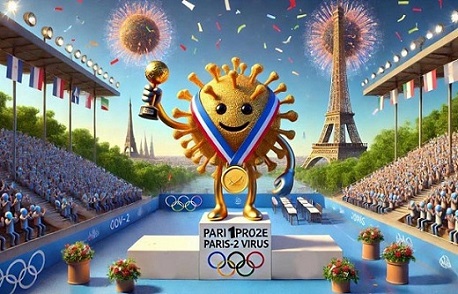Paris 2024 Olympics sees 48-plus COVID-19 cases. Actual numbers could be much higher
Nikhil Prasad Fact checked by:Thailand Medical News Team Aug 07, 2024 8 months, 2 weeks, 5 days, 12 hours, 34 minutes ago
The
Paris 2024 Olympics have become a focal point for the ongoing battle against COVID-19, with over 48 athletes testing positive for the virus. This situation underscores the reality that the pandemic is far from over, with the virus continuing to circulate globally. Despite stringent measures and protocols, the presence of COVID-19 at the Games highlights the challenges faced by athletes and organizers alike. The actual number of cases could be much higher, raising questions about the effectiveness of current detection and reporting systems.
 Paris 2024 Olympics sees 48-plus COVID-19 cases
Paris 2024 Olympics sees 48-plus COVID-19 cases
Image - AI Generated by TMN
High-Profile Athletes Affected
Several high-profile athletes have been impacted by COVID-19 during the Paris Games. British swimmer Adam Peaty tested positive a day after winning silver in the 100m breaststroke, revealing that he had not felt well prior to his diagnosis. Similarly, Australian swimmer Lani Pallister withdrew from the women's 1500m freestyle after falling ill, highlighting the virus's disruptive potential.
COVID-19 in Paris 2024 Olympics: No Surprise
The high circulation of the virus at the
Paris 2024 Olympics is not surprising, given its rampant spread in various countries, irrespective of the season. Typically, respiratory viruses are more active during colder months, but COVID-19 has defied these norms, causing surges in many regions, including the Olympic Village.
Measures and Protocols in Place
The Paris 2024 organizers and the World Health Organization (WHO) have collaborated to mitigate the spread of COVID-19 at the Games. Enhanced measures, including mask-wearing and isolation protocols, have been observed. However, the effectiveness of these measures is continually tested as new cases emerge.
Notable Cases at the Paris Olympics
Australia
Australian swimmer Zac Stubblety-Cook confirmed his COVID-19 diagnosis shortly after winning a silver medal in the men's 200-meter breaststroke. Lani Pallister, another Australian swimmer, also tested positive, leading to her withdrawal from the women's 1500m freestyle event. The Australian Olympic Committee (AOC) reported that 44 athletes and officials tested positive for some form of respiratory or gastrointestinal illness, with 16 athletes confirmed to have COVID-19.
Germany
German decathlete Manuel Eitel announced his withdrawal from the Games due to a COVID-19 infection. Eitel expressed his disappointment on social media, describing the situation as one of the worst days of his life.
Malta
Maltese swimmer Sasha Batt also tested positive for COVID-19, becoming one of the five athletes representing Malta at the Paris Olympics to contract the virus. Despite her diagnosis, Batt is in good health and being monitored by the team doctor.
r />
Great Britain
British swimmer Adam Peaty tested positive for COVID-19 less than 24 hours after winning a silver medal in the men's 100-meter breaststroke. Peaty experienced worsening symptoms after his final and was subsequently tested for the virus.
Testing and Reporting Variations
The actual number of COVID-19 cases at the Paris Olympics remains uncertain due to variations in testing and reporting protocols among different teams. Some teams, like the USA Swimming, do not publicly share health information about their athletes, leading to potential underreporting of cases.
Addressing the COVID-19 Outbreak
At least 48 athletes have tested positive for COVID-19 at the Paris Olympics. However, this number does not meet the threshold for an official outbreak, which would require 5% of the estimated 11,000 athletes to contract COVID-19 within a seven-day period. Despite this, the presence of the virus among athletes is a cause for concern and necessitates ongoing vigilance and robust response strategies.
Global Rise in COVID-19 Cases
Data from 84 countries indicate a rising percentage of positive tests for SARS-CoV-2, the virus responsible for COVID-19. Wastewater surveillance, which provides an early indication of hospitalizations, suggests that SARS-CoV-2 circulation is significantly higher than reported. This is concerning as the virus continues to evolve, posing a risk of more severe variants that could evade current medical interventions, including vaccinations
Conclusion
The Paris 2024 Olympics serve as a stark reminder that COVID-19 remains a significant global health challenge. The virus's continued circulation and evolution underscore the need for effective response systems and vaccinations, particularly for those most at risk. As the world watches the Games, the health and safety of athletes and officials must remain a top priority, with ongoing efforts to monitor, report, and mitigate the spread of COVID-19.
For the latest updates and comprehensive coverage on COVID-19 and its impact on global events, visit Thailand Medical News. The importance of staying informed and vigilant cannot be overstated as the world navigates through the persistent challenges of the pandemic.
Read Also:
https://www.thailandmedical.news/news/they-are-back-europe-sees-covid-19-positivity-rates-soar-above-20-percent-us-faces-million-infections-daily
https://www.thailandmedical.news/news/most-americans-oblivious-that-covid-19-is-now-surging-in-45-states-of-which-26-have-high-infections-levels 